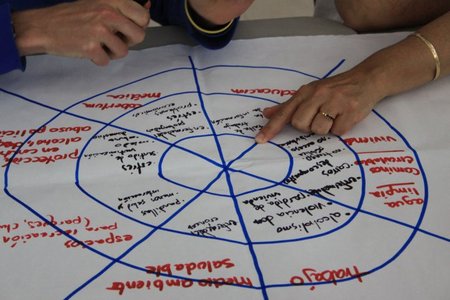The Human Rights Immigrant Community Action Network
HURRICANE was a human rights documentation program that NNIRR spearheaded in 2007 – 2011.
While HURRICANE is no longer active, NNIRR is continuing to document human rights abuses at the US-Mexico Border with or Spotlight: Mapping and Documentation for Human Rights on the Borderlands. The following information shares some of the tools and reports produced by this important work. Decades later, we find that there are similar patterns of abuse and impunity experienced by migrant communities. If you wish to get involved in our Spotlight project, email: borderdesk@nnirr.org
HURRICANE PROJECT HISTORY, TOOLS & REPORTS
HURRICANE offers communities the tools to begin genuine dialogue and engage community members and leaders in a community-based process to document abuses as an organizing strategy.
Documentation begins with dialogue. Dialogue means sharing our stories, our dreams and our struggles to decide the justice we want.
The Seven Steps | Los Siete Pasos

The 100 Stories Project was been the heart of NNIRR’s HURRICANE initiative, putting a human face to the tragic consequences of the U.S. government’s enforcement policies. With the 100 Stories Project, community members, families, advocates, organizers and allies told their stories, gathered community testimonies and reported human rights abuses to organize demands for redress and justice.
HURRICANE, NNIRR’s human rights abuse documentation initiative, aimed to:
- Build leadership & capacity in immigrant communities and in our movement to systematically track, document and seek redress for human rights abuses and rights violations committed against members of our communities.
- Expose patterns of abuses and support local organizing and advocacy for meaningful changes in policies and practices.
- Strengthen relationships and build genuine alliances between diverse immigrant communities facing abuses and rights violations, and facilitate communication, solidarity actions, and collaboration.
- Support local community organizing “in the eye of the storm”: we recognize the resilience and strength of local communities organizing in the midst of tumultuous circumstances and crises. Human rights documentation means organizing “in the eye of the storm” to sit, talk and listen to one another and figure out the changes we want and how we will get them.
While HURRICANE is no longer active, NNIRR is continuing to document human rights abuses at the US-Mexico Border with or Spotlight: Mapping and Documentation for Human Rights on the Borderlands.
YOU CAN TAKE ACTION & BEGIN TO COLLECT STORIES IN YOUR OWN COMMUNITIES:
- Interview a community member, co-worker, or friend about a rights violation or abuse.
*NNIRR is not currently accepting submissions of testimonies, however we encourage you to continue recording and reporting human rights violations and abuses.
Groundbreaking Grassroots Human Rights Reports
Over a three year period beginning in 2007, HURRICANE produced an annual human rights report highlighting the impacts of U.S. immigration enforcement policies on workers, communities, and families. By raising the voices of our communities, we organized for redress and accountability while continuing to advocate for changes in immigration policies that are fair and just and do not compromise or undermine human rights.
- Over-Raided, Under Siege: U.S. Immigration Laws & Enforcement Destroy the Rights of Immigrants (January 2008) affirmed that the U.S. DHS subjects immigrant and refugee communities “to a deliberate and distinct form of ‘collective punishment,’ resulting in widespread violations of basic constitutional and human rights.”
- Guilty by Immigration Status (September 2009) revealed that “immigration policing- using immigration status to implement repressive policies to detain persons- is now pervasive as a draconian form of social, economic and political control from the womb to the workplace.” In addition, the report noted the dramatic expansion and consolidation of an “immigration control regime,” that violates the human rights of immigrants, including legal permanent residents and U.S. citizens at the U.S.-Mexico border and in the U.S. interior. (pp i)
- Injustice for All: The Rise of the U.S. Immigration Policing Regime (December 2010) found that the U.S. has built a brutal system of immigration control and policing that criminalizes immigration status, normalizes the forcible separation of families, destabilizes communities and workplaces, and fuels widespread civil rights violations. (pp iii)
You can read the Executive Summary here.
